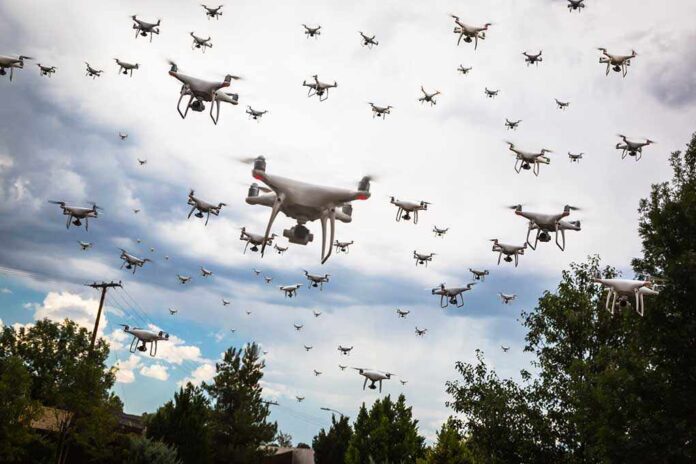Congress is deliberating a ban on Chinese drones, sparking debates on its potential impact on national security and economic stability.
At a Glance
- The ban targets DJI and similar brands for security reasons.
- DJI holds a dominant market share in the U.S. drone industry.
- Industries reliant on DJI drones could face disruptions.
- Some lawmakers call for enhanced regulations rather than a full ban.
Legislative Action on Chinese Drones
The U.S. Congress is considering a bill as part of the annual defense bill to ban drones manufactured by Chinese companies, notably DJI and Autel Robotics. This measure, embedded in the Countering the CCP Drones Act, has emerged due to growing concerns about data privacy and national security. The objective is to curb foreign technological intrusion suspected of facilitating surveillance or data breaches. The legislative move is aligned with the U.S.’s broader strategy of imposing stricter controls on foreign technology firms perceived as security risks.
DJI, a dominant player in the U.S. market, controls an estimated 70% to 90% of the drone market share. Should the ban proceed, it might lead to significant disruptions across various sectors reliant on drone technology, including aerial photography, infrastructure inspection, and public safety. Without viable alternatives, transitioning to other brands could result in financial strain and operational delays for these industries, alongside potential job losses and reduced revenue.
Congress could ban new drones from two Chinese manufacturers https://t.co/VVnAyjp9I6 pic.twitter.com/E1t6hxwVxK
— Reuters (@Reuters) December 9, 2024
Technical and Economic Implications
The debate over this potential ban highlights broader concerns about the impact on technological innovation within the U.S. drone industry. Critics caution that discouraging competition by banning dominant players like DJI could hinder progress and lead to market fragmentation, inconsistent standards, and products of lesser quality. On the other hand, proponents argue for a more nuanced approach—imposing strict regulations that address security threats without causing economic harm.
An outright ban could have broader diplomatic repercussions, potentially straining US-China relations and inviting retaliatory measures. The complexity of enforcing such bans was underscored when DJI partnered with Texas-based Anzu Robotics to sidestep restrictions. Anzu rebrands and sells drones manufactured in Malaysia under a licensing agreement with BYD, mirroring DJI’s specifications.
🚨#ChinaWeek Update: @RepStefanik 's H.R. 2864, the Countering CCP Drones Act passes the House!
Chairman @RepMoolenaar in support of the bill ⬇️
"This bill would add Chinese drone company @DJIGlobal to the @FCC Covered List, meaning that any future models of DJI drones would… pic.twitter.com/qQIX9S0A7p
— Select Committee on the Chinese Communist Party (@committeeonccp) September 9, 2024
Ongoing Investigations and Future Directions
The U.S. House Select Committee on the Chinese Communist Party is examining the operations and DJI affiliations of Anzu Robotics, whose business strategies have incited criticism from legislators concerned about the potential for covert surveillance. This issue reflects ongoing challenges in executing national security restrictions against technology from nations seen as adversaries.
As discussions continue, the balancing act between safeguarding national interests and supporting economic vitality through technological innovation remains critical. Lawmakers advocate for solutions avoiding the detrimental effects on businesses and workers reliant on Chinese drone technology, perhaps through professional oversight and technological safeguards.
Sources:
- https://www.realclearpolicy.com/articles/2024/09/18/congresss_drone_ban_threatens_american_business_with_unintended_consequences_1059362.html
- https://www.newsmax.com/newsfront/china-drone-ban/2024/12/09/id/1190971
- https://freebeacon.com/national-security/this-chinese-drone-company-found-a-workaround-to-congresss-ban-on-doing-business-in-the-us-before-the-ban-is-even-passed/
- https://www.reuters.com/technology/dji-could-be-banned-launching-new-products-us-under-proposed-bill-2024-12-09/











